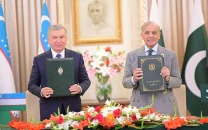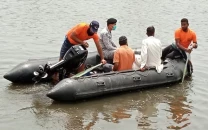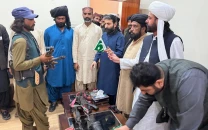Divided we fall: Afghanistan, Pakistan urged to initiate conciliatory efforts
Political, military leadership of both the countries urged to respect each other’s internal matters.

Participants of two-day conference on Pakistan-Afghanistan relations called upon leadership of the two countries to initiate trust building process and join hands in combating security threat that has become a constant headache for the region. PHOTO: FILE
To achieve these goals and for sustainable peace, both the neighbouring countries should take initiatives mutually beneficial and helpful in the much-needed trust building process, said a declaration issued on Sunday after the end of the conference on “International Security Assistance Force (ISAF) withdrawal from Afghanistan: Bilateral partnership for Peace and cooperation”, organised by the South Asian Free Media Asscoiation (Safma).

The declaration urged the political and military leadership of the two countries to initiate reconciliatory efforts with firm footing, because the prevalent trust deficit is a major hurdle in the way of solving bigger issues.
They participants emphasised on the promotion of people-to-people contact which could be achieved in political, economic, social development and strategic fields by strengthening each other’s, democratic institutions, values and rule of law in the light of fundamental human and civil rights.
The two countries could live with peaceful coexistence by avoiding antagonistic approaches and by respecting each other’s policies, it said.
Border conflict
The participants noted that both the neighbours needed to resolve, through negotiations, the longstanding differences over their “International Border” while monitoring and managing their “Physical Border”.
While rejecting violence and authoritarian practices and respecting pluralism, democracy and tolerance have also become crucial for both the societies to adopt.
Moving towards the more serious and urgent issues, the declaration warns against possible instability and void that may be created with the drawdown of US-led Isaf troops which, according to Pakistan’s de facto Foreign Minister Sartaj Aziz, could be averted if the international community fulfils the promises they have made with Afghanistan for its future support.
Militaries on both sides while taking practical steps to implement the earlier agreed upon “Strategic Partnership Agreement” should help each other out at intelligence and forces levels to curb the menace of terrorism and religious extremism. The military establishments of the two countries were also asked to dismantle terrorist sanctuaries and put an end to asylum provision to extremists or secessionists.
Future agenda
In the fall of the drawdown of US-led ISAF troops from Afghanistan, both the countries, after putting old differences behind, should join forces to fill the security void and take responsibility for peace keeping and stability at home. Both the players must follow the principles of peaceful co-existence and respect each other’s sovereignty and not meddle in each others’ internal affairs.
Apologists covering up or diverting attention from the principal existential threat to the societies from terrorism should be persuaded not to lend support to those spreading anarchy and violence to achieve their nefarious designs. Also crucial are the development of a regional consensus and the promotion of regionalism with Iran, India, Russia, China and the Central Asian states for sustainable peace and stability of the region. Political settlements cannot be brought through martial actions alone hence they must be preceded by diplomatic efforts to avoid collateral damage.
Locally, both the countries should train their police forces along modern lines and empower them to meet the challenge without the need for help from other institutes with which a greater synergy should also be kept in mind in the meanwhile.
As the cultivation, processing and trafficking of narcotics is a major source of funding for the militants, efforts must be made to tackle this menace by providing substantial alternative to the farmers while mutually aiming for a Bilateral Free Trade Area agreement by taking necessary steps to develop customs, tariff, fiscal and monetary union to overcome inefficiencies, dumping and double taxation. Ways could also be found to address trade deficit of Afghanistan through investment and services.
As a the most important point for an over-all societal change, more women should be brought into formal power structures and security forces in both countries, given their ability to wield influence over their families and ultimately, their communities, the declaration concluded.
Published in The Express Tribune, December 16th, 2013



















COMMENTS
Comments are moderated and generally will be posted if they are on-topic and not abusive.
For more information, please see our Comments FAQ